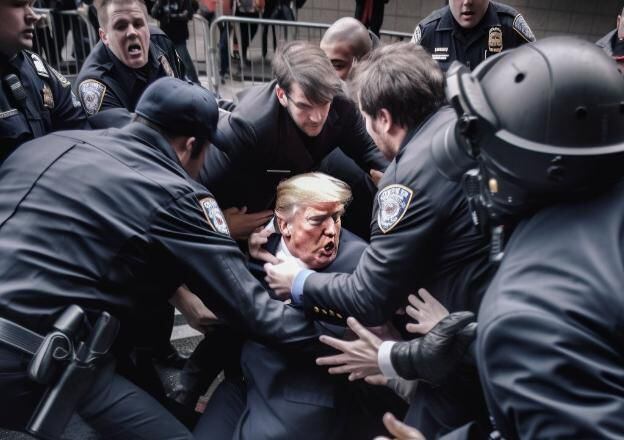
A fake image of the arrest of the former Republican president donald trump; a video of a bleak future if the democrat Joe Biden is re-elected or a false audio of both throwing insults: the advancement of technology artificial intelligence (AI) could dangerously fuel misinformation in 2024 US election campaigns, observers say.
The 2024 presidential race is expected to be the first US election to see widespread use of advanced AI-powered tools that have increasingly blurred the lines between fact and fiction.
The Republican and Democratic campaigns are likely to take advantage of this technology, which is cheap, easily accessible and whose advances have far outpaced regulatory responses, to reach voters and produce fundraising emails in seconds.
But tech experts also warn of the malicious exploitation of AI to wreak havoc at a time when the political climate is already hyperpolarized in the United States and many voters question even verified facts, such as Trump losing the 2020 election. .
In a sample of what may go mainstream before the 2024 election, fake images of Trump being forcibly detained by NYPD officers, created by an AI arts generator, went viral in March.
Last month, in response to Biden’s announcement of his 2024 re-election bid, the Republican National Committee almost instantly released a video made with AI-produced imagery of the alleged negative effects this would have if it materialized.
They showed realistic photos of panic on Wall Street, of Chinese forces invading Taiwan, waves of immigrants overwhelming border agents, and a military takeover of San Francisco amid terrible crime.
And earlier this year, realistic but completely false audio of Biden and Trump, who many believe will meet next year in a 2020 rematch, hurling insults at each other spread on the video platform TikTok.
“The impact of AI will reflect the values of those who use it; Bad actors in particular have new tools to leverage their efforts to fuel hate and suspicion, or falsify images, sounds, or video in an effort to mislead the press and public.”Joe Rospars, founder of the left-wing political consultancy Blue State, told AFP.
“Fighting those efforts will require vigilance from the media and tech companies, and from the voters themselves.”added Rospars.
The AI lies
The efficiency of the AI is obvious, regardless of the user’s intentions. When AFP ordered ChatGPT to create a pro-Trump campaign newsletter, feeding it false statements from the former president debunked by US fact-checkers, it produced, in seconds, a clever campaign document outlining those falsehoods.
Then, by further prompting the chatbot to give it a nuance “more angry”adjusted those falsehoods with a more apocalyptic tone.
“The current level of AI lies a lot”explained to AFP Dan Woods, former director of technology for the Biden campaign in 2020.
“If our foreign enemies just need to convince an already hallucinating robot to spread misinformation, then we should be prepared for a much bigger disinformation campaign than what we saw in 2016.”he said, referring to allegations of interference from Russia when Trump won.
At the same time, AI advances will become a tool that “change the game” to understand voter attitudes, said Vance Reavie, executive director of Junction AI.
deny reality
Campaign staff previously spent hours reaching voters with speechwriting and talking points, Twitter posts and quizzes, but AI makes the same job possible in a fraction of the same time.
“Content creation is time consuming and expensive, now imagine being able to do ten times as much without additional staff effort”highlighted Reavie, who warned that there will also be a lot of false content that is difficult to discern.
The ability of Americans to agree on objective truths will also be challenged, with a large part of the population already deeply mistrusting the traditional media.
“The concern is that the easier it is to manipulate the media, the easier it will be to deny reality.”Hany Farid, a professor at the UC Berkeley School of Information, explained to AFP. “It is particularly dangerous”sentenced.
Source: Gestion
Ricardo is a renowned author and journalist, known for his exceptional writing on top-news stories. He currently works as a writer at the 247 News Agency, where he is known for his ability to deliver breaking news and insightful analysis on the most pressing issues of the day.












